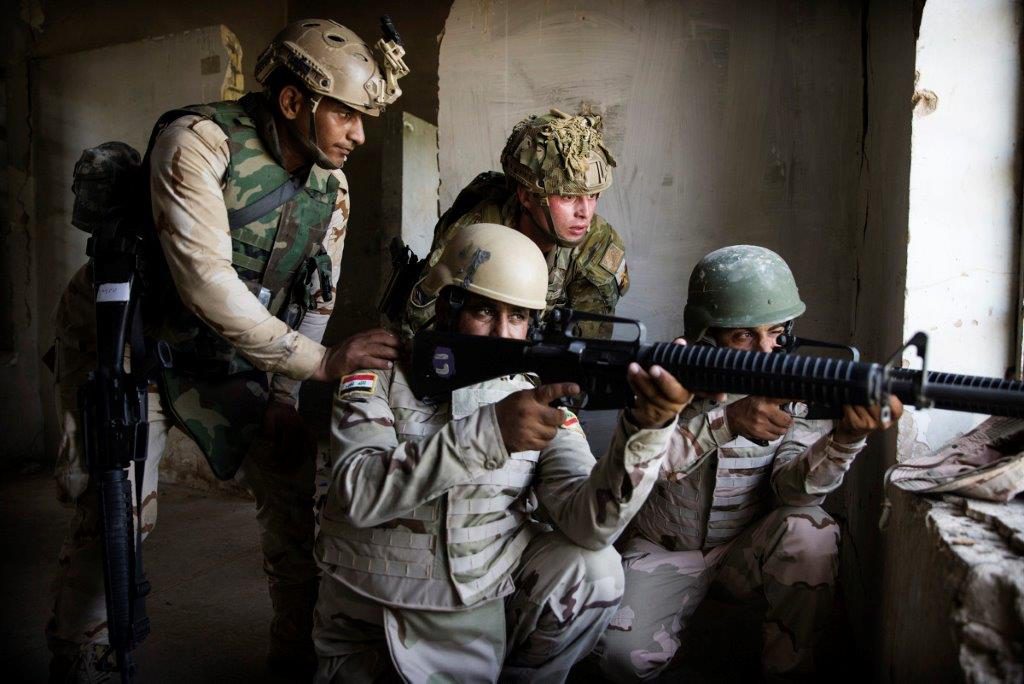Marise Payne: ‘eliminate Daesh fighters in Iraq and Syria’

The foreign fighters of the Islamic State terror group, or Daesh, must be eliminated in Iraq and Syria to stop them coming home to carry out attacks in Australia and the region, says Defence Minister Marise Payne.
Senator Payne told The Strategist that ADF personnel were well aware of why they were in the Middle East. ‘They know we are supporting the international coalition in the self defence of Iraq to ensure that the sort of acts perpetrated by Daesh and its acolytes and the metastasised versions of Daesh around the world will not, as far as we are humanly able to prevent, come to our shores or to our region.’
Senator Payne said she’d recently discussed progress in the operation and its objectives with coalition and regional nations.
‘It’s a serious focus for us and for our neighbour nations, particularly Indonesia, Malaysia, Singapore and The Philippines from whence foreign fighters came and to where they may return.’
‘The ideal outcome, the preferred outcome, is that they are not in a position to be able to return from the Middle East as Mosul is liberated and as progress is made in places like Raqqa in Syria. If they’re able to leave and intend to head in this direction, then we’ll continue to work very hard with our counterparts to address those concerns.’
Asked if that meant killing terrorist fighters who went to Iraq from Australia and the region, Senator Payne replied: ‘Yes. We would rather that they were eliminated as part of the process of the self-defence of Iraq and the operations being undertaken in Syria.’
Australian and New Zealand army instructors in the Taji military complex, northwest of Baghdad, have trained 22,000 Iraqi personnel including 3500 police. The military training for the police is intended to help them hold and protect areas recaptured from the terror group.
Australia’s Special Operations Task Group is supporting Iraq’s Counter Terrorism Service in its assault on Mosul and the RAAF’s Air Task Group is providing crucial air support.
The Iraqi forces now fighting their way into the toughest parts of Iraq’s second largest city daily demonstrated that they were willing to fight and to die to defeat IS, Senator Payne said.
In seven months of heavy fighting, Eastern Mosul has been cleared and the Iraqis are now retaking the city’s Old Quarter in the West. This is the densest urban terrain with narrow streets which are constantly booby trapped with improvised bombs, and are too tight for armoured vehicles.
‘There’s been very significant progress in those seven months but it continues to be an extraordinarily difficult fighting environment,’ Senator Payne said.
Daesh fighters use individual civilians, families and sometimes larger groups as human shields.
The RAAF puts a massive effort into mission planning to avoid civilian casualties in such heavily built up areas. ‘And after each operation we review every weapon strike to ensure they are consistent with their pre-strike approvals. Rules of engagement are absolutely designed to minimise the dangers to civilians and to comply with our obligations under international law.’
‘All of that said, this is a fight, a fight for the self-defence of Iraq and to combat the spread of a pretty toxic form of terrorism throughout the world,’ Senator Payne said.
‘Nobody wants to see civilian casualties. Fortunately to date, we have been able to indicate that Australians have not been involved in those to the best of our knowledge or capacity to determine. But none of us can walk away from the complexity of the environment, the difficulty of the fight and the fact we are dealing with a toxic enemy.’ Australian special forces calling in air strikes was essential to the Iraqi advance, Senator Payne said. The Australians were proud of the soldiers they were turning out, she said. When Iraq and Australia played a soccer world cup preliminary match in Australia, Australian and Iraqi soldiers played their own game at Taji. The Australians did not begrudge the Iraqis a 5-1 win.
At a recent counter-Islamic State meeting in Copenhagen, Iraq’s Defence Minister, Arfan al-Hayali, spoke of life in those parts of the city that had returned to normal. In parts of Mosul police were back directing traffic, Senator Payne told The Strategist.
In March boarding parties from the Australian frigate, HMAS Arunta, seized 800 kgs of hashish hidden in a cargo of coffee aboard a dhow. This month they seized 250 kg of heroin from another vessel. Such interceptions have a significant impact on the supply of money to the terrorists to finance operations.
American commanders told Senator Payne that the RAN crews brought great skill to these intercepts and they ensured each step was fully documented so that further action, including prosecutions, could follow.
While anti-IS forces were closing in on Raqqa, Australian air operations were being carried out in other parts of Syria. ‘Any change to that would have to come in a request to Australia and we would examine that on its merits,’ Senator Payne said.
With RAAF strike jets, air to air refuelling tankers and the Wedgetail command and control aircraft all operating over Syria, Senator Payne was asked if she was concerned about the safety of Australian crews after the US missile strikes on a Syrian air base.
Senator Payne said the Americans had warned the Australians in advance that the strikes were to take place. ‘When that happens we review force protection measures and we adjust those as required. Force protection is very much at the forefront of our minds.’
So far there has been no request for Australian troops to help train friendly forces in Syria, Senator Payne said. If such a request was made, it would be considered on its merits. ‘But at this stage we are fully focused on supporting the Iraqi security forces.’